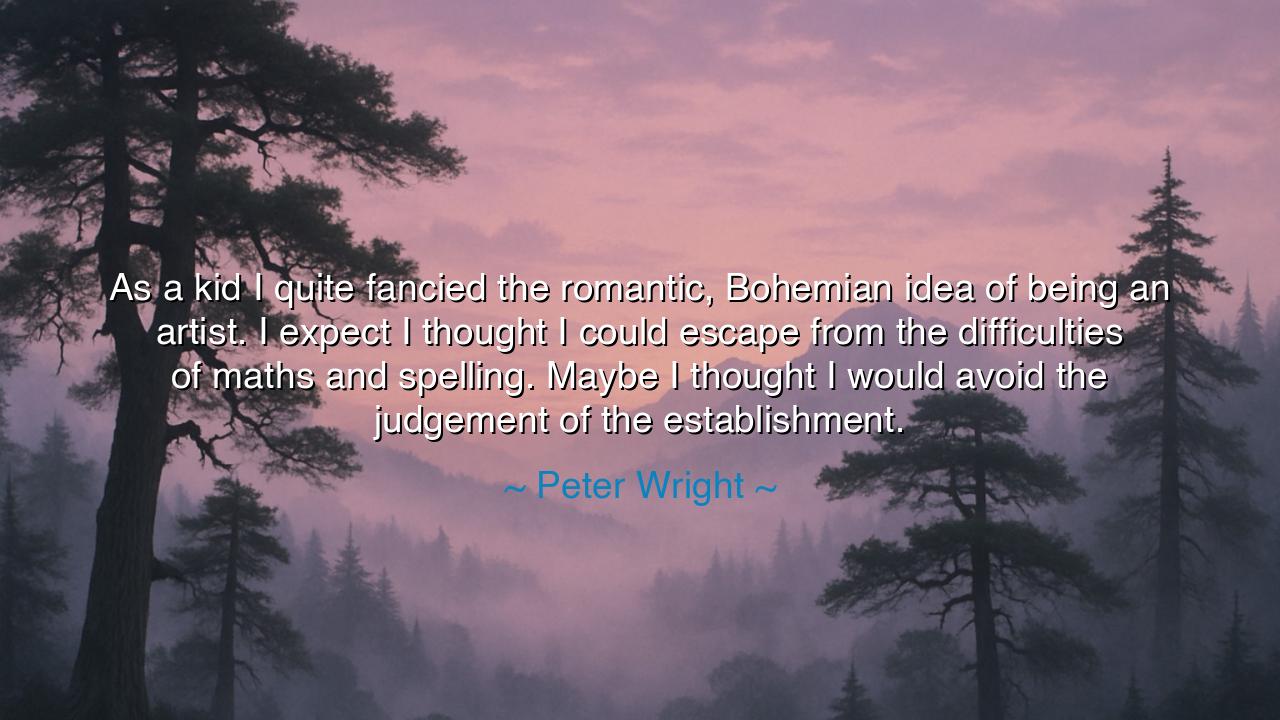
As a kid I quite fancied the romantic, Bohemian idea of being an
As a kid I quite fancied the romantic, Bohemian idea of being an artist. I expect I thought I could escape from the difficulties of maths and spelling. Maybe I thought I would avoid the judgement of the establishment.






“As a kid I quite fancied the romantic, Bohemian idea of being an artist. I expect I thought I could escape from the difficulties of maths and spelling. Maybe I thought I would avoid the judgement of the establishment.” Thus spoke Peter Wright, and in these words shines the ancient longing of youth: to flee from the rigid walls of convention into the freedom of dream and creation. His confession reveals that behind every artist’s beginning lies not only a spark of inspiration, but also a rebellion against the chains of order, of measure, of rules that seem to confine the spirit.
The romantic vision of the artist has always been tied to freedom. To be Bohemian is to cast off the strictures of society, to live in garrets and coffee houses, to trade security for expression. The young Wright, weighed down by the burdens of maths and spelling, saw in art not merely a craft, but an escape—a way to live by passion rather than by rule. This is the origin of many a dreamer’s path: the yearning to find a life unbound by the calculations of the mind, yet radiant with the stirrings of the heart.
History is filled with those who chased this vision. Consider the young Vincent van Gogh, who fled the judgment of his religious schooling and the cold expectations of commerce to throw himself into painting. His was the romantic, Bohemian pursuit of truth through color and form, a desperate attempt to escape the prison of ordinary life. Though he suffered and was judged harshly by the establishment, his art endures as testimony to the power of one who would not be confined by spelling books or balance sheets.
Yet Wright’s words carry a gentle irony. For though the romantic idea of being an artist promises freedom, it also brings its own burdens. The establishment does not vanish simply because one turns to paint or poetry. Judgement still comes, from critics, from audiences, even from the artist’s own restless heart. The difficulties of maths and spelling may be escaped, but new difficulties arise—of hunger, rejection, obscurity. Thus, his reflection is a lesson in maturity: the artist’s life may be freer, but it is never free of challenge.
The ancients too saw this tension. Plato spoke of poets as inspired by divine madness, yet also dangerous to the order of the state. They were exalted, but also mistrusted, for their freedom threatened the measured calculations of society. To choose the romantic, Bohemian path is to accept both glory and exile, inspiration and instability. Wright, even in memory, acknowledges that what drew him as a child was not only the joy of art, but the hope of escaping judgment. And yet, escape is never complete.
From this, we learn a vital truth: one cannot live a life free of difficulty, whether one chooses numbers or colors, laws or dreams. Each path brings its own trials. The artist is judged no less than the scholar; the dreamer suffers no less than the realist. The difference lies not in escaping struggle, but in choosing which struggle is worth living. Wright’s childhood longing reminds us that freedom lies not in the absence of hardship, but in pursuing hardships that align with one’s soul.
Practical action flows from this wisdom: do not pursue a calling merely to flee discomfort. If you despise maths or spelling, do not imagine art will be free of difficulty. Instead, ask yourself: where does my heart find strength to endure hardship? If you can suffer for beauty, then the artist’s path is yours. If you can labor for truth, then the scholar’s path is yours. Choose not the easy road, for none exists, but the road where your soul burns brightest.
So, children of tomorrow, heed Peter Wright’s reflection. The romantic vision of the artist is noble, but it is not escape—it is exchange. To step into the Bohemian dream is not to avoid the judgment of the establishment, but to face a different kind of judgment, one perhaps fiercer, yet also more authentic. Choose your struggle wisely, and walk it with courage. For whether with brush or with numbers, the measure of a life is not in what you escape, but in what you endure and create.






AAdministratorAdministrator
Welcome, honored guests. Please leave a comment, we will respond soon